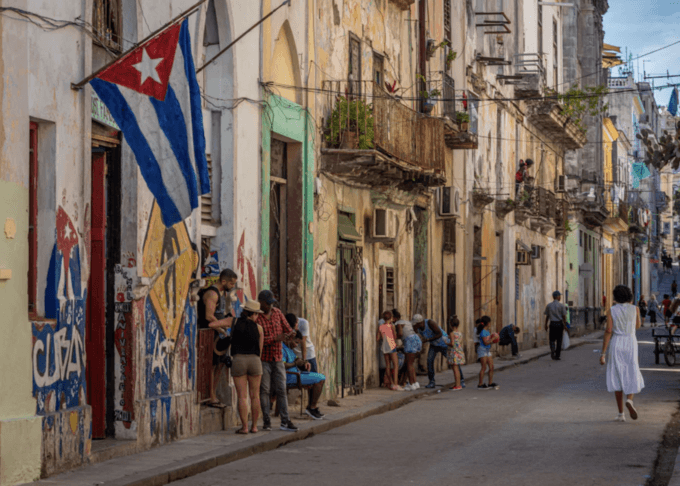U.S. Policy Toward Cuba Three Years on from July 11
END THE EMBARGO!

Photo by JF Martin
Three years ago this Thursday, thousands of people took the streets in Cuba’s largest anti-government demonstrations in decades.
The historic protests lasted only one day, but Cuba is still facing ruinous fallout in the form of unrelenting economic warfare waged by the Biden administration.
We take a look back at what led to the July 11 protests and how they were used by Biden to justify abandoning Obama’s detente in favor of Trump’s hostile hard-line policy.
A New Cuba Policy?
“We need a new Cuba policy,” Joe Biden declared at an October 2020 campaign rally in Florida.
As vice president, Biden and his wife Jill had had a front-row seat to Obama’s historic rapprochement with Cuba.
“It’s all about the relationships,” said Jill Biden during an October 2016 visit to Cuba, in which she became the first U.S. official in decades to visit the city of Camaguey and met with students, teachers, entrepreneurs, women leaders, artists, dancers and athletes, among others.
Those budding relationships were promptly severed by Donald Trump.
Trump effectively closed the U.S. embassy, restricted U.S. travel to Cuba and unleashed a barrage of devastating sanctions that pummeled the country’s economy.
Covid dealt a knock-out blow.
Cut off from investment and credit by U.S. sanctions, Cuba began suffering acute scarcities of food, fuel and medicine.
“The cushion that every other country in the world has, in terms of borrowing money during crisis, was not available to Cuba,” economist Emily Morris said in Episode Five of Belly of the Beast’s documentary series The War on Cuba.
When Biden assumed office in January 2021, many expected he would promptly roll back Trump’s hard-line policy and return to Obama’s engagement.
Instead, Biden stalled.
“Joe Biden is not Barack Obama on Cuba policy,” Juan González, who served as the National Security Council’s senior director for the Western Hemisphere under Biden, told CNN in April 2021. “Those who think the United States is now going to enter a dialogue of multiple years with Cuba don’t understand the political moment.”
González didn’t explain what this “political moment” was and the CNN journalist didn’t ask.
A Missed Opportunity
With its economy in freefall, Cuba had still managed to stave off a Covid spike for more than a year thanks to an internationally acclaimed public health system that prioritizes preventive and community-based care. Meanwhile, Cuban scientists were working around the clock to finalize the mass production and distribution of home-made vaccines.
The Biden administration hindered their efforts, ignoring appeals to lift sanctions on Cuba on humanitarian grounds.
Ultimately, Cuba’s vaccines arrived a few months too late, as U.S. sanctions caused the delay of key ingredients, according to Dagmar García, one of the scientists who developed Cuba’s Soberana vaccine.
“Often a crisis gives you an opportunity to change policy,” former CIA analyst and National Intelligence Officer for Latin America Fulton Armstrong said in Episode Five of The War on Cuba. “And this administration completely missed the opportunity.”
In June 2021, as the Delta variant swept Cuba, Covid patients overwhelmed Cuba’s hospitals and the death toll soared.
For many Cubans, who had endured ever-worsening scarcities with no end in sight, this was the last straw.
Biden’s Response to July 11
On July 11, protests erupted in cities across the island.
Major media outlets trumpeted the Miami-borne slogan “Patria y Vida,” portraying the July 11 protests as a cry for freedom and democracy.
But the country’s shortages of food, electricity and medicine were the primary factors driving people to take the streets.
The protests started in San Antonio de los Baños, a small city near Havana, in response to power cuts that lasted hours.
Biden’s response was to double down on the very policy that helped cause the crisis.
On July 22, he announced new sanctions on Cuba.
“This is just the beginning,” said Biden.
Biden also pledged to “support the Cuban people” by providing Internet access and vaccines.
These promises not only proved to be empty, they also didn’t respond to Cuba’s most pressing needs.
The Cuban government cut Internet access on July 11 in the wake of the protests, and blocked access to certain apps in the following days. But by the time Biden announced his administration was working to provide Internet access to the Cuban people, that access had already been fully restored.
Meanwhile, if not for U.S. sanctions, the country may already have had its Covid vaccines by the time of the outbreak.
Cuba would end up becoming the only Latin American country to produce its own Covid vaccines and it inoculated 90% of its population by the end of 2021, surpassing the vaccination rate in the United States.
“Biden can’t say he’s going to send vaccines, and impose a blockade that prevents the arrival of food, medications, supplies essential for our lives,” said Dagmar García.
Appeasing Hardliners
The “new Cuba policy” Biden had promised during the campaign was replaced by his full-fledged embrace of Trump’s “maximum pressure” strategy and the Cuban-American hardliners behind it, including Sen. Bob Menendez.
“The first person to bring this to my attention and to make sure that we were on top of this was Senator Menendez,” Biden told a group of Cuban-Americans at the White House three weeks after the protests. “The Cuban American people are actually the best ambassadors for the Cuban people.”
A president pandering to the Cuban-American hardliner lobby in Florida is nothing new. But it’s difficult to see the upside for Biden.
Long before Biden’s abysmal debate performance, Florida was considered a lost cause for the Democrats. Even if the state was in play, Miami’s Cuban-American hardliners are not exactly Biden’s constituency.
“It’s almost like they were trying to be more Trump than Trump on the Cuba issue,” said Armstrong. “If you try to chase after the right-wing leadership of the Miami community, which the Republicans already own, you’re not going to get anywhere.”
Nor is it clear if Biden got anywhere appeasing “Gold Bar Bob,” who is currently on trial in a federal court on corruption charges, reportedly becoming the first sitting senator to be tried on unrelated criminal charges twice.
Menendez was forced to step down as chair of the Senate Foreign Relations Committee. Yet now, nearly three and a half years into his term, Biden keeps trucking on with Trump’s Cold War-era policy toward Cuba.
The consequences have been disastrous.
Biden’s Cuba Policy Backfires
Cuba’s economy, now plagued by inflation, has plunged into an even deeper crisis. Power cuts are a daily occurrence across the island. Fuel shortages are commonplace. The shelves of public pharmacies are bare. Earlier this year, the Cuban government asked the United Nations’ World Food Program for subsidized powdered milk for children, the first time it had ever made such a request.
Yet Cuba’s humanitarian crisis – fueled by the sanctions maintained by Biden – seems to have only encouraged his administration to keep tightening the screws.
“The more that Cuba suffers, the more optimistic some people behind our policies are that they don’t have to do anything, that Cuba is going to collapse,” said Armstrong in the Belly of the Beast documentary Uphill on the Hill.
Cuba has not collapsed. Meanwhile, Biden’s policy has backfired in glaring ways.
Human rights concerns are ostensibly a pillar of the administration’s Cuba policy. But there is no evidence that punishing Cuba with sanctions has improved the country’s human rights. The opposite may be true.
“Our embargo and putting [Cuba] on the State Sponsor List of Terrorists is literally strangling the island and I think it is tantamount to a human rights violation,” Rep. Jim McGovern (D-MA) told a group of activists last year.
Meanwhile, a policy of aggression toward Cuba has proven counterproductive when it comes to civil and political rights.
“Every time U.S. and Cuban relations become more tense and more hostile, the Cuban government feels more under threat and more of a sense of being under siege, so they become less tolerant of domestic critics,” Cuba expert and Professor of Government at American University William LeoGrande said in an interview with Belly of the Beast journalist Liz Oliva Fernández. “It’s when U.S.- Cuban relations are warming up a little bit that the Cuban government feels less threatened and is more tolerant of a broader range of political discussion.”
More than a thousand protesters were detained on July 11, 2021. In the following months, hundreds were sentenced to prison. Three years later, many remain incarcerated.
Meanwhile, Cuba’s economic collapse has sparked an unprecedented wave of migration to the United States. More than half a million Cubans have crossed the border in the last two years, presenting another self-induced political problem for Biden.
Biden has loosened some restrictions on travel and implemented some measures to support Cuba’s burgeoning private sector. But overall, his policy remains largely indistinguishable from that of Trump.
As Jim McGovern told Oliva Fernández in Uphill on the Hill: “U.S. policy toward Cuba is an embarrassment and a miserable failure.”
“We can’t just refer to this as the Trump policy,” said McGovern. “It’s now the Trump-Biden policy.”
